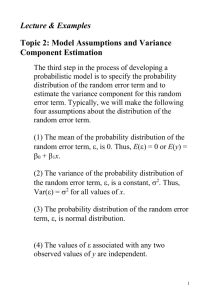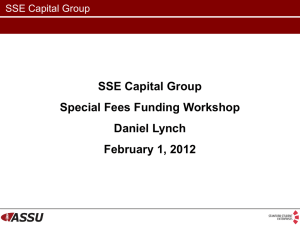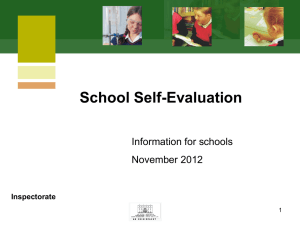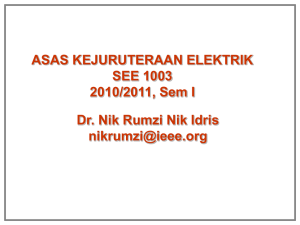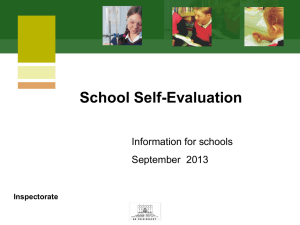Eastern Kentucky University - Central Florida Chapter
advertisement
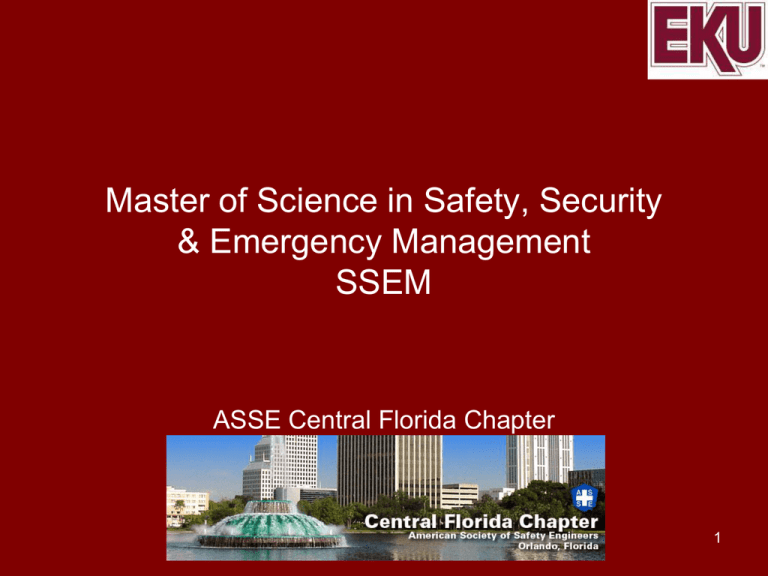
Master of Science in Safety, Security & Emergency Management SSEM ASSE Central Florida Chapter 1 Paul English • Paul English is the current Director of Safety, Environmental & Medical Services for E-ONE, Inc. located in Ocala, Florida. He has worked for Fortune 100 companies including Nestle and Ford Motor Company in different facets of safety, security and emergency response operations. While at Ford Motor Company, he was the recipient of the President's Health & Safety Award for Innovation representing The Americas for reducing injuries and illnesses while launching 3 new vehicles. • He earned a B.S. in Fire & Safety Engineering Technology specializing in Industrial Risk Management and an M.S. In Safety, Security & Emergency Management from Eastern Kentucky University. He has numerous publications regarding incident investigation, process safety management, benchmarking safety metrics and emergency response. He is an active member of the American Society of Safety Engineers-Central Florida Chapter and the Marion County Regional Manufactures Association. 2 Eastern Kentucky University • EKU is located in Richmond, KY 30 miles South of Lexington, KY on I-75. • Eastern Kentucky University was founded in 1906. Over the last one hundred years, we have grown to 168 degree programs that serve more than 15,500 students each year. • EKU provides all of the opportunities available at large schools but maintains that ‘small school’ feel. 3 Eastern Kentucky University • Masters program was started in 1992 with a grant from NIOSH. • Program started with 5 students in the program. 4 Admission to the Program • Applications for admission are accepted 6 times annually. Successful completion of the following requirements is necessary for admission to pursue study leading to a Master of Science in Safety, Security & Emergency Management: – Complete the Graduate School online application and pay $35 application fee – Submit official transcripts from college where bachelor’s degree was conferred – Hold a baccalaureate degree from an accredited institution of higher learning – Achieved an undergraduate GPA of at least 3.0 overall or in the last 60 hours of the baccalaureate program – GRE scores of 425 verbal and 425 quantitative and an analytical writing score of at least 3.0 on the GRE, or a 375 on the MAT – TOEFL score of 550 for International Students – Three letters of recommendation 5 Admission Considerations • Provisional Admission Provisional admission may be granted upon the recommendation of the Safety, Security & Emergency Management Department when an applicant is unable to supply all of the necessary application materials (e.g. official GRE scores, three letters of recommendation) prior to admission consideration, but who otherwise meet the admission requirements. Complete and satisfactory application materials are required before the end of the semester in which the student has registered. • Probationary Admission Probationary admission may be granted upon the recommendation of the Safety, Security & Emergency Management Department to an applicant who does not meet certain requirements for clear admission, but does show promise for successful graduate study. For example, probationary admission may be granted to a student who’s GPA and GRE scores are below the minimum requirement. After obtaining probationary admission, the minimum condition to transfer to clear admission status is the successful completion of approved graduate course work at EKU with a graduate GPA of at least 3.0 and with no more than one grade of ‘C’ or lower. 6 Core Curriculum 18 hrs Total • SSEM 815 – Safety, Security & Emergency Management Administration • SSEM 822 – Workers' Compensation/Labor Law • SSEM 833 – Legislation & Legal Compliance • SSEM 826 – Emergency Prep/Response • SSEM 865 – Auditing for Safety, Security & Emergency Management • SSEM 880 – Research and Planning for Safety, Security & Emergency Management 7 Additional Courses Offered 12 hrs. Total • • • • • • • • • • • • • • • • • • • SSE 820-Strategic Planning for the Fire and Emergency Services SSE 824-Leadership in Fire & Emergency Services SSE 825-Public Sector Finance and Budgeting SSE 828-Industrial Safety Management SSE 829-Public Emergency Services SSE 832-Construction Safety SSE 834-Corporate Compliance SSE 839-Applied Learning SSE 841-Applied Study in Safety, Security & Emergency Management SSE 845-Personal/Environmental Hazards *SSE 890-Topical Seminar in Ergonomic and Human Factors I *SSE 890-Topical Seminar in Ergonomic and Human Factors II *SSE 890-Topical Seminar in Ergonomic and Human Factors III *SSE 890-Topical Seminar in Ergonomic and Human Factors IV SSE 897-Independent Study HLS 800-Homeland Security Policy Analysis HLS 810-Critical Infrastructure Protection HLS 820-Intelligence for Homeland Security HLS 830-Hazards & Threats to Homeland Security 8 Thesis or Electives 6 hrs. Total • SSE 898 Thesis (6 Credits) – Students will have the option to complete 30 credit hours of coursework and a Thesis, or complete 36 hours of coursework and take a proctored comprehensive exam. – The comprehensive exams can be taken at EKU or at an approved remote site. The Thesis option requires an approved committee of graduate faculty. 9 Program Concentrations & Certificates • The online Master of Science in Safety, Security & Emergency Management Program offers concentrations and certificates in – – – – Occupational Safety Homeland Security, and Fire & Emergency Services *Ergonomics • Each covering a set of courses designed to meet the demands and challenges of the real world. 10 Program Concentrations & Certificates Occupational Safety Homeland Security Fire & Emergency Services SSE 828 HLS 800 SSE 820 Industrial Safety Management Homeland Security Policy Analysis Strategic Planning for the Fire and Emergency Services HLS 810 SSE 824 Critical Infrastructure Protection Leadership in Fire & Emergency Services HLS 820 SSE 825 Corporate Compliance Intelligence for Homeland Security Public Sector Finance and Budgeting SSE 845 HLS 830 Personal/Environmental Hazards Hazards & Threats to Homeland Security SSE 832 Construction Safety SSE 834 SSE 829 Public Emergency Services *Ergonomics *Ergonomic & Human Factors I *Ergonomic & Human Factors II *Ergonomic & Human Factors III *Ergonomic & Human Factors IV 11 Tuition and Fees • Online Students – $500.00 per credit hour • Application Fee to EKU – $35.00 • Many companies now offer reimbursement for accredited on-line or distance learning programs as part of their tuition assistance programs. – Check with you HR Department for details on your company’s policies. 12 Compass Knowledge • Since 1993, Compass Knowledge Group has partnered with select academic institutions to help them develop online programs that are academically superior and economically successful. • Compass is a full service firm. As such, we provide any or all of the following services in a way that seamlessly dovetails with our academic partner's academic and business processes. 13 Who are our students? 14 Distance Learning at EKU How does it work? What is required? 15 Distance Learning & Blackboard • EKU utilizes a blended learning atmosphere of: – Video Lectures – Discussion Boards – Quizzes – Assignments – Research Papers – Final Examinations 16 Video Lectures 17 Discussion Boards • Discussion questions posted in Blackboard for each week. • Starting on Monday of each week, you are to access Blackboard and respond in that week to the questions by 10:00 p.m. Wednesday of that week. • In addition, you are expected to make a minimum of two (2) entries in response to your peer responses or posts (these will all appear on the Discussion Board). • You should not post all entries at one time but rather reflect on the insight that others have brought to the discussion. 18 Discussion Boards • The postings serve as a reflection of the students understanding of course material to the facilitator and instructor. • Daily interaction with the instructor/ facilitator via the Virtual Office and class Discussion Board is vitally important to your success in this course. • Students must schedule appropriate time on a daily basis in which they interact with the facilitator on the various course topics which will be discussed. • Students should post any and all questions they have regarding the subject matter or any issue regarding this class in the Virtual Office and Discussion Boards. 19 Example of Discussion Sessions 1. Is the OSH Act an effective law in safeguarding the American workplace? Is it effective in 2007? Why or why not? Please explain. 2. Are the three agencies established under the OSH Act still in alignment today? 20 21 Quizzes • Quizzes are designed to help students reflect on the course material and prepare them for the final exam. • Quizzes assess the understanding of the video lessons and required course readings. You will have to complete both of these requirements to be successful on the quizzes. • Quizzes are usually multiple choice or short answer questions. • Some tests are timed and others are not. 22 Class Assignments • Class assignments can include: – Writing abstracts on SSEM articles and current events – Researching specific events, standards or policies affecting SSEM. – Writing safety or security programs for specific standards. 23 Class Assignments SSEM 832 Examples • Write a short paper (3-4 pages) on what you learned are the most important aspects of Electrical safety and how you might apply this in your everyday life as a safety professional. • Write a 3-4 page paper (double-spaced) on current issues with the multi-employer citation policy. – (Note: you may want to read/review some current legal decisions in Westlaw - see EKU library link). 24 Research Papers SSEM 834 Example • Select a corporate compliance related situation (one that has already occurred) that you would like to know more about and is of interest to you. • Analyze this situation to identify the problems encountered, the things which could have been done to prevent and/or minimize the effects and other key factors. • Your research paper should include, but not be limited to, the following: – Synopsis of the safety and personnel related issue – Effects of the safety issue on the workplace – Response – Critique of response – Overall assessment of the situation • The paper should be a minimum of 20 pages in length and is due the last week of class. You will not be penalized for exceeding the page limit if it becomes necessary to do so. 25 Research Paper Examples • • • • • Incidents Texas City BP Explosion “The Station” Nightclub Fire Ford Motor Company Rouge Explosion Triangle Shirtwaist Fire Imperial Sugar Refinery Explosion • • • • • Standards & Policies Proposed Combustible Dust Standard PSM issues in Ammonia Refrigeration Incident Investigation Quality Control Proposed Crane Standard NFPA 1901 Apparatus Design 26 Final Exams • Final exams are open book and consist of multiple essay questions. • Some class finals call for a presentation PPT to be developed and turned in with course materials. • Some classes call for comprehensive safety programs to be submitted with course work. 27 Bachelor of Science in Fire & Safety Engineering Technology and Certificate Program in Fire Administration Eastern Kentucky University 28 Bachelor of Science in Fire & Safety Engineering Technology • Eastern Kentucky University has one of the nation’s top undergraduate programs in Fire & Safety Engineering Technology now offered completely online. • A program designed to meet the needs of today’s working fire and safety professionals. • The program’s comprehensive curriculum and high level of relevancy make the Fire & Safety Engineering Technology a must-have degree for today’s first response professionals. • With a solid reputation as a premier source for expertise in fire and safety, you have the opportunity to learn from nationally and internationally recognized leaders in these fields. • Eastern Kentucky University's bachelor degree and certificate program allows you to increase your knowledge of the fire and safety industry, facilitating the chance for career advancement while continuing to work full time and enjoying your life the way you want 29 Program Requirements (75 Credits) Required • • • • • • • • • • • FSE101 Fire Prevention FSE120 Fire Behavior and Combustion FSE201 Building Construction FSE221 Fire Protection Systems FSE223 Fire and Emergency Scene Operations FSE225 Legal Aspects of Fire Protection and Safety FSE230 Fire Prevention Organization and Management FSE320 Principles of Emergency Services FSE322 Fire Protection Structures & System Design FSE350 Fire and Arson Investigation I FSE360 Fire Protection Hydraulics and Water Supply Electives • • • • • • • • • • • FSE200 Applied Fire/Safety Analysis FSE300 Technical Report Writing for Emergency Services FSE305 Hazardous Materials FSE349 Applied Learning in Fire and Safety Engineering FSE 355 Fire Dynamics FSE361 Principles of Occupational Safety and Health FSE365 Emergency Service Instructional Methodology FSE375 Emergency Service Resource Management FSE390 Workers’ Compensation I FSE400 Advanced Emergency Service Administration FSE425 Disaster and Community Fire Defense Planning 30 Additional Coursework Required • TRS235 Emergency Vehicle Roadway Operations Safety • PSY200 Introduction to Psychology • CHE101 w/ CHE107 Chemistry I w/ College Chemistry I Lab: 4 Credits • MAT107 College Algebra 31 Up and Coming Safety Professionals • The BS program offered online can be used as a vehicle for people in your organization who show interest in EHS who do not have a formal degree. • Students can be steered towards a safety focus in the Bachelor's Program. • A full Occupational Safety On-line BS program is currently being developed and will be offered in the coming years. – Best Case, Fall 2009 – Worst Case, Summer 2010 32 More information • For more information on the BS program, please visit: – http://firescience.eku.edu/ • For more information on the MS program, please visit: – http://safetymanagement.eku.edu/ 33 Questions & Answers????? 34
